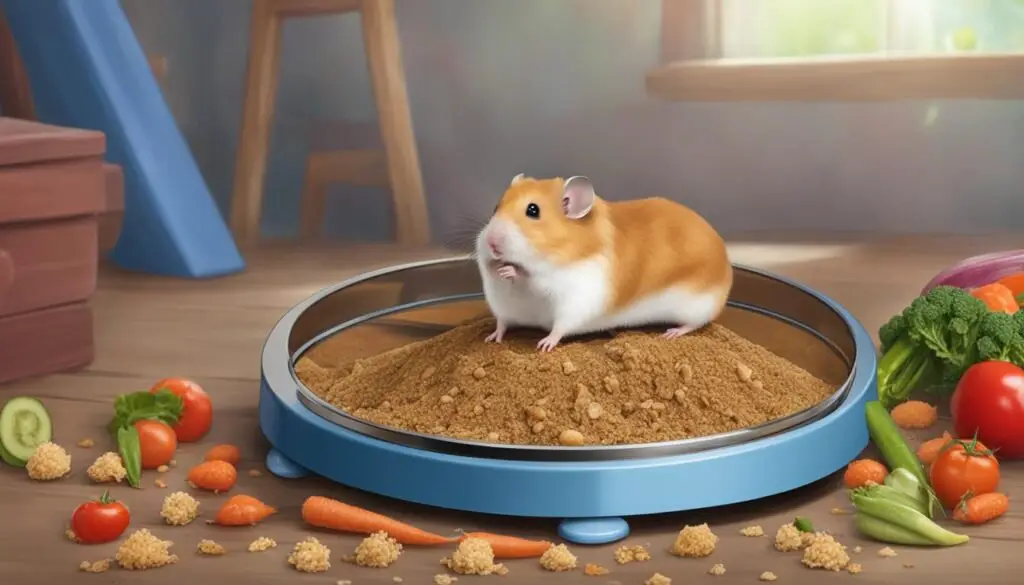Did you know that sudden weight gain in hamsters is a common problem that many pet owners face? If your furry friend has recently packed on some extra pounds, you may be wondering what could be causing this unexpected change in their health. In this article, we will explore the various reasons behind your hamster’s sudden weight gain, from excessive food intake to hormonal changes and everything in between. Understanding these factors will help you address the issue and ensure your hamster remains healthy and happy.
Excessive Food Intake
One of the reasons why your hamster might suddenly become fat is excessive food intake. Hamsters have a natural tendency to eat, and if they are given an unlimited amount of food, they may overeat and gain weight rapidly. Just like us, hamsters can get fat from overeating.
When hamsters consume a lot of food, especially high-fat foods, it can lead to quick weight gain. It is important to provide your hamster with a balanced and healthy diet, avoiding excessive treats or foods high in sugar. While it may be tempting to give your hamster extra treats or snacks, excessive food intake can quickly lead to weight gain and potential health issues.
Monitoring the amount of food you give your hamster is essential. Ensure that you are following the recommended portion sizes for your hamster’s breed and age. Pay attention to the nutritional content of the food you are feeding them and avoid overfeeding. Remember, a healthy hamster is a happy hamster.
Exercise is also crucial in preventing sudden weight gain. Encourage your hamster to engage in physical activity by providing them with toys, tunnels, or an exercise wheel. Regular exercise will not only help your hamster burn off excess calories but also keep them mentally stimulated and happy.
Laziness and Lack of Exercise
Another factor that can contribute to your hamster becoming fat all of a sudden is laziness and a lack of exercise. If your hamster is not interested in being active and spends most of its time resting or sleeping, weight gain can occur.
It is important to provide your hamster with an environment that promotes physical activity and mental stimulation. A spacious cage with tunnels, hideouts, and climbing structures can encourage your hamster to explore and move around. Additionally, an exercise wheel is an essential accessory that allows your hamster to run and burn off excess calories.
Ensuring your hamster has opportunities to move and play can help them stay fit and prevent sudden weight gain. You can provide toys and puzzles that engage their natural instincts, such as hamster balls or treat-dispensing toys. These not only keep your hamster active but also mentally stimulated.
Regular playtime outside the cage can also be beneficial for your hamster’s physical and mental well-being. Set up a safe and secure area where your hamster can explore under your supervision. This can include a playpen or a closed-off room with hamster-proofed furniture and no small or hazardous objects within reach.
Remember, hamsters are naturally active animals and need plenty of opportunities to exercise. By providing a stimulating environment, introducing exercise equipment, and engaging in playtime, you can help your hamster maintain a healthy weight and prevent the negative effects of a sedentary lifestyle.
Hormonal Changes
Hormonal changes can have a significant impact on the weight of your hamster. This is particularly true for female hamsters, who experience fluctuations in hormones during their gestation period and ovarian cycle.
These hormonal changes can lead to sudden weight gain and obesity, especially in the belly area. If you notice your female hamster becoming noticeably larger around the abdomen, it may be a result of hormonal imbalance.
If you suspect that your hamster’s weight gain is due to hormonal changes, it is crucial to seek veterinary advice. A veterinarian can determine the underlying cause of the hormonal imbalance and recommend appropriate treatment or management strategies to prevent further weight gain.
Having a clear understanding of the role hormonal changes can play in your hamster’s weight can help you take proactive steps to maintain their health and well-being.
Old Age
As your hamster gets older, you may notice a change in their weight. This is because, just like humans, hamsters’ metabolism slows down with age, making it easier for them to gain weight. The reduced activity levels that often come with old age can also contribute to weight gain in older hamsters.
Hamsters of an advanced age may also experience hormonal imbalances, which can further exacerbate weight gain. These imbalances can affect their appetite and energy levels, making it harder for them to maintain a healthy weight.
To help your aging hamster maintain a healthy weight, it’s important to make adjustments to their diet and exercise routine. Offer them a balanced diet with appropriate portions, ensuring they receive all the necessary nutrients without overfeeding. Additionally, provide plenty of opportunities for physical activity, such as exercise wheels and toys to promote movement and prevent excessive weight gain.
Remember, weight gain in older hamsters is a common occurrence, but it’s crucial to monitor their weight and overall health regularly. If you have concerns about your hamster’s weight or suspect any underlying health issues, it’s always best to consult with a veterinarian for guidance and assistance.
Image:

Pregnancy and Post-Pregnancy Weight
If your female hamster has suddenly become fat, it could be due to pregnancy. Pregnancy can cause weight gain in hamsters, and they may remain fat even after giving birth due to hormonal changes.
During pregnancy, female hamsters gain weight as they carry the growing babies. And even after giving birth, their bodies go through changes that can lead to post-pregnancy fatness.
To ensure the health of your pregnant hamster, it is crucial to provide proper care and nutrition. Make sure to provide a balanced diet that includes all the necessary nutrients for both the mother and the babies. Regularly monitor your hamster’s weight and consult a vet if you have any concerns.
Remember, hamsters have different nutritional needs during pregnancy and it’s important to provide the right diet and support to promote optimal health for both the mother and her babies.
